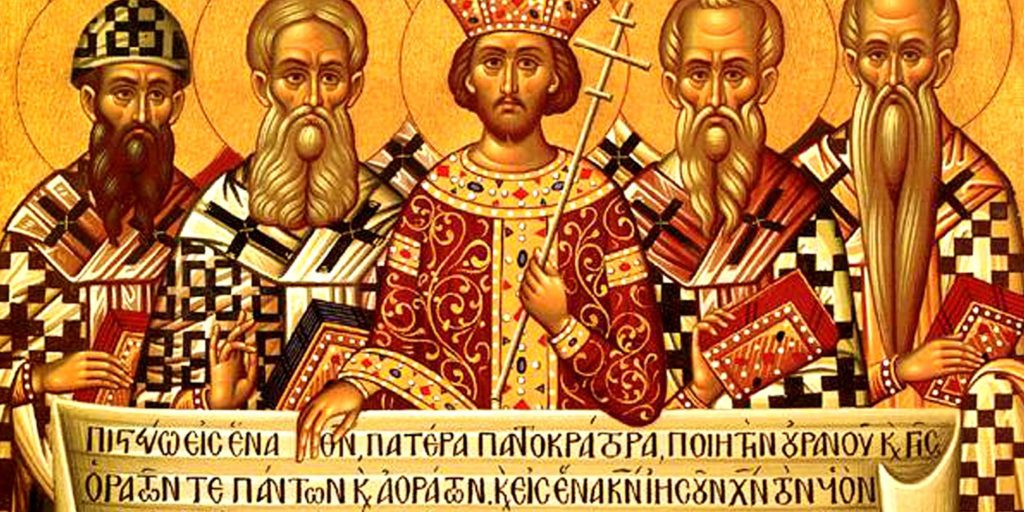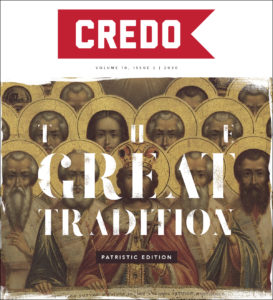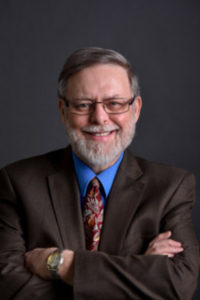
Contemplating God with the Great Tradition
 The new issue of Credo Magazine, “The Great Tradition,” focuses on the early Church Fathers. The following is an excerpt from the issue’s featured interview with Craig Carter. Craig Carter serves as Professor of Theology at Tyndale University in Toronto and as Theologian in Residence at Westney Heights Baptist Church. He was kind enough to answer some of our questions concerning his upcoming book: Contemplating God with the Great Tradition: Recovering Trinitarian Classical Theism (Baker Academic, 2021). This work engages with topics such as premodern metaphysics, classical theism, and how both may offer correctives to the errors of modernity.
The new issue of Credo Magazine, “The Great Tradition,” focuses on the early Church Fathers. The following is an excerpt from the issue’s featured interview with Craig Carter. Craig Carter serves as Professor of Theology at Tyndale University in Toronto and as Theologian in Residence at Westney Heights Baptist Church. He was kind enough to answer some of our questions concerning his upcoming book: Contemplating God with the Great Tradition: Recovering Trinitarian Classical Theism (Baker Academic, 2021). This work engages with topics such as premodern metaphysics, classical theism, and how both may offer correctives to the errors of modernity.
Why is the doctrine of creation ex nihilo so critical for a right understanding of the Creator-creature distinction?
Without the doctrine of creation ex nihilo, we do not have the God of Isaiah who rules the pagan empires and directs history to its telos in the Messiah. It is crucial that we understand that God differs from creatures not in degree, but in kind. God is not a projection of creaturely being and creation is not an extension of God’s being. God is the Creator and has no beginning, whereas every creature has a beginning and depends on God for its origin, as well as for its continuation in existence. Creation ex nihilo is the reason why Yahweh should be worshipped, and it is why no creature should be worshipped. It is the reason for the first and second commandments.
All forms of relational theism, from process theology to dynamic panentheism to open theism to theistic personalism to eco-feminism – all deny creation ex nihilo. The fact that many Evangelical Old Testament scholars are denying that Genesis 1 teaches creation ex nihilo should set off alarm bells. It is no wonder evangelical theologians are failing to uphold the Nicene doctrine of God if they buy into this kind of biblical interpretation. These evangelical Old Testament scholars are retracing the steps of the nineteenth century German higher critics as they revise biblical interpretation on the basis of philosophical naturalism. In fact, one could say that philosophical naturalism just is the denial of creation ex nihilo.
What is lost when we underemphasize transcendence? What would you say to the objection that classical theism makes God unapproachable, unknowable, and unrelatable (in a word – distant)?
What is lost is awe and mystery – in other words the worship of the church is undermined. We lose respect for God and our fear of him evaporates. He becomes a fellow creature with whom we can negotiate, rather than a holy God before whom we bow. Nothing is more important than worship. Even mission and evangelism are oriented to the goal of turning non-Christians into worshippers of the true and living God.
As to the objection, I have no sympathy for it whatsoever. If you want an idol in your own image you can have a cuddly little god who is your best friend forever. But that kind of God cannot save you from hell, cannot comfort you in the presence of death, and cannot overcome the evil all around you. The last thing we need is a helpless idol. We need the real God and we do not get to design him to our specifications. He reveals himself for what he is, and our only choice is to bow in worship or rebel.
Many Christians start to squirm the minute they hear Christianity and Platonism used in the same sentence. Can you clear things up and help us move pass the many caricatures? What is the relationship between the two?
There is tremendous ignorance today about the history of philosophy and classical thought and culture in general, even among pastors and theologians. It is problematic for many reasons and this is one. The phrase “Christian Platonism” is a benign description used by patristic scholars to talk about the revisions of Neoplatonism made by church fathers like Augustine in the light of biblical revelation. By the time of Augustine, Platonism was an 800-year-old tradition and the central philosophical tradition in existence.
The fathers rejected the hedonism of the Epicureans, the pantheism of the Stoics and the materialism of the Atomists. At least the Platonists believed in a simple, eternal, perfect, unchanging God on whom this changing world of flux depends for it continued existence. So, the fathers could at least open a dialogue with them. Augustine, in The City of God, carefully evaluates Platonism and sees some strengths and weaknesses. He takes a few metaphysical concepts from them, corrects them on many points and calls them to become Christians. What I call Christian Platonism could just as easily be called “Augustinianism.”
In the fifth century, Neoplatonism and Christian Platonism were the two main intellectual systems available to an educated person and Christianity won out. So Christian Platonism mediated through Augustine became the basis for the Christian middle ages. It was modified and clarified by Thomas Aquinas and became known as scholastic realism. This philosophical system was the basis of post-Reformation Protestant scholasticism and was rejected by the secular Enlightenment. But it continued to influence Christians well into the twentieth century. Christian Platonism or Augustinianism is the philosophy of C. S. Lewis and J. R. R. Tolkien and we can see it all over their works of fiction, as well as the apologetic writings of Lewis. I believe that the reason why Evangelicals are attracted to Lewis and Tolkien is because the metaphysics of Lewis and Tolkien is so biblical, even though most Evangelicals have no idea what it actually is that they like about Narnia and Middle Earth.
**Read the full interview with Craig Carter in the latest issue of Credo Magazine.

